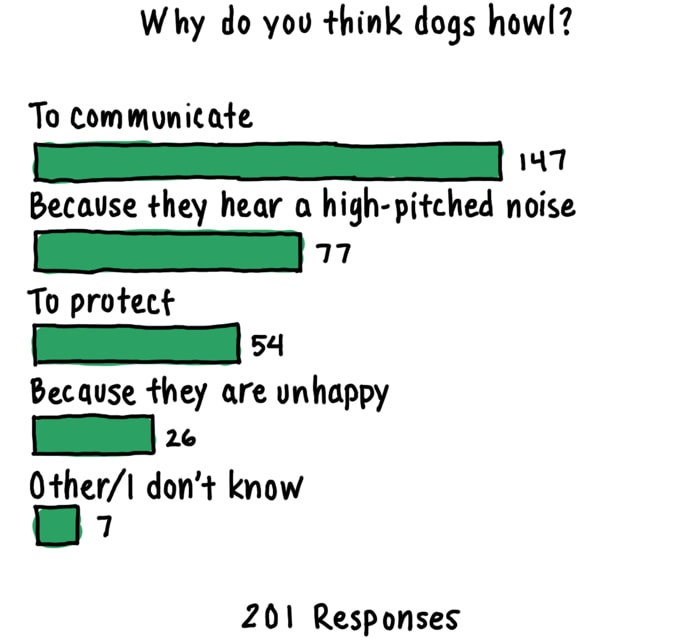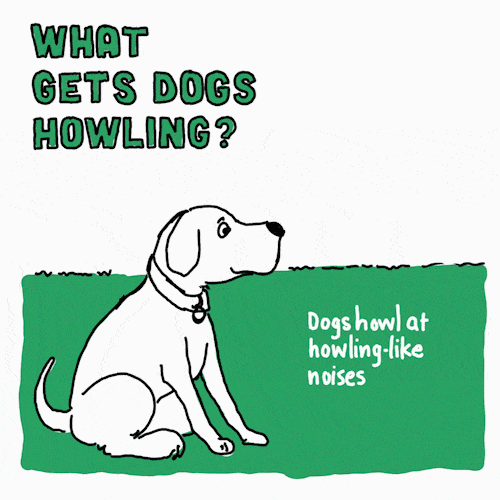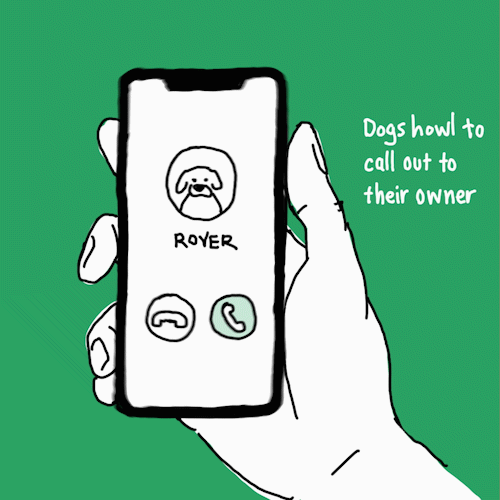

Every pet parent wants to know the meaning of dog howling. Now, we all know what howling sounds like - it’s a high-pitched sound that sounds like a doleful cry. However, many of us are still quite unaware of why do dogs howl. Well, here’s a fun fact: howling for dogs is genetic inheritance. It’s no news that dogs are closely related to wolves. Despite the difference in their sizes, wolves and dogs share around 99% DNA. However, heredity is not the only reason why dogs howl. So, what does it mean when a dog howls, and how can you handle your howling dog? You will find answers to such questions in this article.
To handle a howling dog, you first need to understand the reason why your pet is making this long, wailing noise. Here’s a look at some probable causes of dog howling.
Dogs feel stimulated by high-pitched sounds. Howling is their way of responding to fireworks, sirens, bells, and other noises. This type of howling starts as soon as they hear the shrill sound. As a pet owner, you don’t have to worry about this type of howling since it usually stops when the trigger sound does.
If a dog is excessively attached to you, they might experience separation anxiety. So, once your little companion learns that you won’t be around for a few days, they might start howling under stress and anxiety. If your dog howls every time you need to leave for a long period, it is a sign of hyper-attachment. You might have to treat their anxiety to manage this type of howling. And no, scolding them is not the right way of doing it.
A howling dog could also be seeking attention. And this type of dog howling can be bothersome. You might feel like scolding, questioning, or holding your furball, but you must do the exact opposite of it. Avoid giving your pet any type of attention. Don’t pamper or scold them.
Dogs can sense bad weather, earthquakes, diseases, and so much more. Hence, you cannot rule out the fact that a howling dog could also be trying to alert you of something. Maybe they feel a situation is not right for you or could cause you potential harm. Dogs can sense the intentions of a person through their facial expressions. That’s exactly why dogs howl at some people who try to get near you or your house.
Dogs are still very social animals; it’s just that now we are their pack. When they miss us, they will howl in hopes we respond. Dr. James Serpell, BSc, Ph.D., Professor of Humane Ethics & Animal Welfare at the University of Pennsylvania School of Veterinary Medicine, explains it this way: That [howling] is an attempt on the part of the dog to ask the owner, ‘Where are you so that I can rejoin you?’
Dr. James Serpell doesn’t believe so. “My own research has shown that it is common across breeds. People think huskies may be more prone to group howling.”
Dogs going through separation anxiety may howl excessively when left home alone. Dr. Jo Gale, BVetMed CertLAS MRCVS, Senior Manager for Global Science Advocacy at Waltham Petcare Science Institute, says, “If you reinforce quiet behavior, they are less likely to continue howling.” You can do this by quieting your dog and then leaving for a very brief time before returning and rewarding them when they stay quiet. Gradually increase the time you’re gone to reassure them you’ll always be back.
But what if your pawsome pet is howling due to other reasons? Let’s understand how to handle such situations:
As a pet parent, you must avoid reacting to the howling. This could encourage your dog to howl even more. If you avoid reacting, your dog will understand that howling won’t get their demands met. This might possibly work towards reducing this behaviour in the future.
Pamper your little companion when they do not howl on hearing a siren or bell. Give them attention and love when they are calm to encourage quiet behaviour. Always keep your pet’s favourite treats ready so you can let them know they have been a good boy or good girl by not howling.
If your pooch often reacts to high-pitched sounds, you can even get in touch with a dog trainer. They can work with your dog to change their response to triggering sounds like sirens and fireworks.
Note: Training your fur baby is a time-consuming process. Hence, stay consistent with the actions recommended above and your pet will learn to control their howling triggers.
If you're looking for the perfect dog for you, try our Dog Breed Selector today and enjoy a lifetime of tail-wagging joy.
To understand what a howling dog means to communicate, you need to first read the situation. When dogs howl, it could mean anything–a response to high-pitched sounds, an attempt to attract attention, a suspicion towards someone, etc.
Yes. Since dogs are genetically programmed to howl, it is okay to leave them alone when they do that. However, if it bothers your neighbours, you might want to learn to handle your fur baby or get professional help.
While howling sounds like a long cry, it doesn’t always mean that they are sad.
To stop your dog’s howling, you can reward their calm and quiet behaviour. If they are howling for attention, avoid reacting to it. If you need more help, you may want to reach out to a dog trainer.





Deworming is the process of eliminating worms from the body, and it's an essential part of caring for your furry friend. Whether your puppy has already been diagnosed with worms or you simply want to take preventative measures, understanding how to deworm a puppy is crucial for their health and well-being.
But what exactly are worms, and how do puppies get them? Many types of worms can infect dogs, including roundworms, hookworms, whipworms, and tapeworms. These parasites are usually transmitted through contaminated soil, water, or food, and they can cause serious health problems if left untreated.
As a responsible pet parent, it's imperative to understand the process of deworming and how to keep your puppy safe and healthy. This blog will cover everything you need to know about deworming puppies, including the symptoms to look out for and the best ways to deworm your furry friend. Whether you are a new puppy parent or just looking to refresh your knowledge, this blog will provide the information you need to keep your pawfect pal worm-free.
Deworming your new pup is an indispensable part of adopting a dog. However, navigating the various deworming options and methods can be overwhelming. Here, we will uncover 4 must-knows to successfully deworming your puppy, including how often your puppy needs to be dewormed, the most effective treatment methods, and the importance of prevention. By understanding these key factors, you can ensure that your puppy remains happy and healthy, free from the discomfort and potential health risks caused by worms.
It's important to understand the importance of deworming your furry friend. This helps prevent the spread of worms and parasites, which can harm their health. Puppies need to be dewormed often due to their small size and underdeveloped immune systems.
According to experts, puppies should be dewormed every 2 weeks until 3 months of age and then every month until they are 6 months old. This helps to ensure that the worms are effectively eliminated from their system. It's also important to deworm pregnant dogs as they can pass worms on to their puppies in utero.
Along with deworming at regular intervals, good hygiene is essential to guarding against the spread of worms. Make sure you wash your hands after touching or playing with your puppy and clean up their waste immediately.
Overall, deworming is a crucial part of keeping your puppy healthy. Following a regular puppy deworming schedule and practising good hygiene can help protect your furry friend from harmful parasites.
Several worms can infect puppies, including roundworms, hookworms, whipworms, and tapeworms. These worms can cause various symptoms in puppies, including diarrhoea, vomiting, weight loss, and anaemia. It is important to deworm puppies regularly to prevent these worms from causing serious health problems.
Even if worms are not visible on your puppy, it does not mean they are not present. Some worms, such as tapeworms, can be challenging to detect because they are small and often pass through the stool in small pieces. Additionally, some worms can be present in the intestine without causing visible symptoms. Hence, follow a regular puppy deworming schedule and ensure that this four-legged angel is protected against these worms.
Worms in puppies can have many symptoms that can be difficult to spot, especially in young and small dogs. Common symptoms of worms in puppies include:
Deworming is especially important for puppies born to mothers who have worms, as they can be infected even before their birth. Following a proper deworming schedule and keeping an eye out for these symptoms can help keep your puppy healthy and happy. If you suspect your puppy has worms, it's important to take them to a veterinarian for treatment.
Worms are a common problem in puppies and can cause serious health issues if left untreated. The most common types of worms affecting puppies include roundworms, hookworms, and tapeworms. Symptoms of a worm infestation may include vomiting, diarrhoea, weight loss, and a pot-bellied appearance.
The good news is that worms are easily preventable and treatable in puppies. It's important to get your puppy on a regular deworming schedule, as recommended by your veterinarian. This will typically involve giving your puppy a deworming medication every few weeks until they reach a certain age. In addition, keeping your puppy's environment clean and preventing them from ingesting potentially contaminated objects can help prevent worms.
Suppose your puppy does end up with worms. In that case, your veterinarian will likely prescribe a deworming medication that can be given orally or through injection. It's important to follow the recommended treatment plan and continue the treatment for the entire prescribed course to ensure all the worms are eliminated.
Overall, it's important to be proactive in preventing and treating worms in puppies.